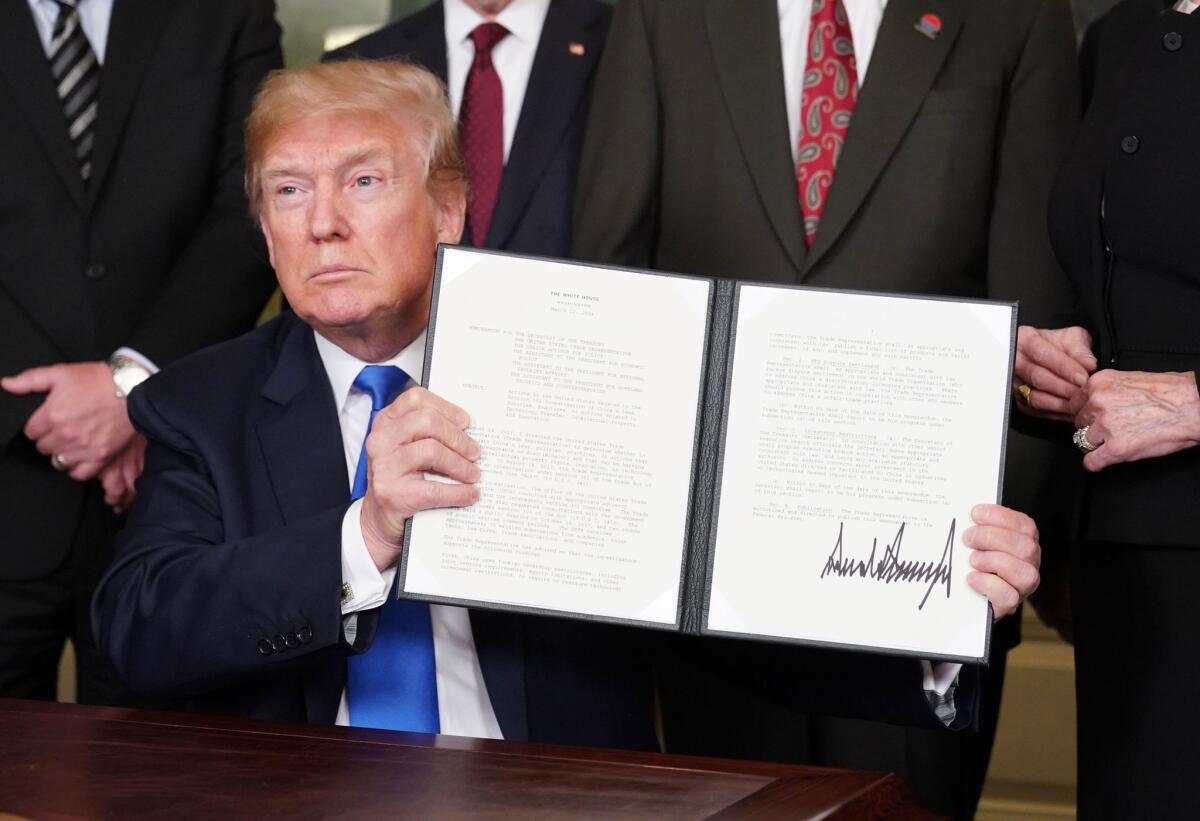Newsletter: Cal Inc.: No, Mr. President, China isn’t paying your tariffs. We are

- Share via
Welcome to the weekly newsletter of the L.A. Times Business Section. I’m consumer columnist David Lazarus, here today with a handy explainer on how tariffs work.
President Trump keeps insisting that China, not U.S. consumers, are paying for his tariffs on Chinese goods. He is, to put it politely, wrong.
Tariffs Hurt the Heartland, a coalition of business and trade groups, issued a report last week saying American consumers and businesses paid $6 billion in tariffs in June, up 74% from the same month a year ago. More than half that total came from Trump’s tariffs.
The trade coalition called June “one of the highest tariffed months in U.S. history.”
To hear Trump tell it, this is great news. “It is now even more obvious to everyone that Americans are not paying for the Tariffs — they are being paid for compliments of China, and the U.S. is taking in tens of Billions of Dollars!” he tweeted.
That’s just not true. The New York Federal Reserve estimates that tariffs already imposed by the administration are costing about $830 per U.S. household. The next round of tariffs, scheduled to begin next month, could add roughly $200 per household to that annual cost.
For those who don’t know (including, it seems, the president of the United States), tariffs aren’t penalty fines. They’re taxes, paid to U.S. Customs and Border Protection by companies that import goods from abroad. Such companies — manufacturers, retailers, electronics firms — typically pass along their higher costs to customers in the form of higher prices.
Customs duties collected in the fiscal year that started last October have now hit $50 billion, up from $28.3 billion for the same 10 months in 2018, according to the U.S. Treasury. This puts us on track for about $72 billion in tariff revenue for the year.
“We have billions of dollars coming into our Treasury — billions — from China,” Trump crowed in January. “We never had 10 cents coming into our Treasury; now we have billions coming in.”
Again, those billions are not from China. They’re from you.
If there’s some trade leverage to be had, it’s from American consumers possibly buying fewer Chinese-made goods because the products are becoming more expensive. That could place economic pressure on Chinese authorities.
However, because nearly everything is made in China these days, it can be difficult to find a domestically produced alternative. So the reality is that U.S. consumers, more often than not, will simply adjust to higher prices — which means having less money to spend elsewhere.
“Taxing hardworking Americans isn’t doing a thing to address China’s trade abuses,” said Tariffs Hurt the Heartland spokesman Jonathan Gold. “Instead, these tariffs are costing American jobs, raising prices, hurting farmers and derailing U.S. economic growth.”
Now then, here are some news events on the horizon and few stories from last week that caught my eye:
LOOKING AHEAD:
How does WeWork work?: The co-working startup WeWork is expected to make public its IPO filing as early as next week, Bloomberg reports. It could be the nation’s second biggest IPO of the year after Uber, and the filing should offer some insight into the inner-workings of yet another much-hyped startup with big losses.
STORY LINES:
Bottled wind: Solar panels and wind turbines are great when the sun is shining and the wind is blowing. But there’s plenty of time when they can’t be harnessed. One possible solution: use the energy generated by solar panels and wind turbines to pump compressed air into an immense salt cavern in Utah. When there’s a need for energy, release the compressed air to turn a turbine and ship power to Los Angeles.
Gun market: The online marketplace EBay has rules against the sale of assault rifle accessories. But that doesn’t stop sellers from listing a dozens of add-ons, modifications and parts — some of which are aimed to make these weapons more lethal, a Times investigation reveals.
Road to self-driving: Since 2016, Tesla has offered customers the chance to pay a premium for a not-yet-released Full Self-Driving feature. But is Tesla anywhere close to ready with fully driverless technology? And what would that even mean? Those are questions giving the auto industry pause.
WHAT WE’RE READING:
Tech’s reputation problem: Stanford is famous for steering new workers into the tech industry. But as skepticism about Silicon Valley spreads, perspectives are changing even in Palo Alto, Slate reports.
A startup’s demise: Remember MoviePass? That startup that burned through heaps of cash selling movie theater-goers all-you-can-watch access for a flat rate? Business Insider tells the story of its rapid rise and equally rapid fall, which reportedly included an attempt to limit losses by surreptitiously changing some users’ passwords to lock them out of their accounts.
More to Read
Inside the business of entertainment
The Wide Shot brings you news, analysis and insights on everything from streaming wars to production — and what it all means for the future.
You may occasionally receive promotional content from the Los Angeles Times.











